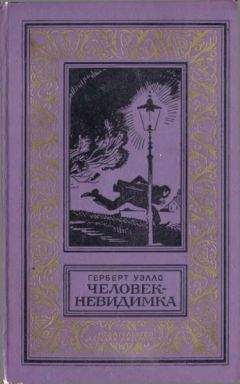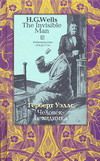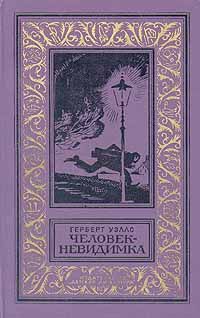H. Wells - Английский язык с Г. Уэллсом "Человек-невидимка"
object [`ObGekt], jewel [`GHql], cheval glass [Sq`vxlglRs]
“At last I reached the object of my quest, a dirty, fly-blown little shop in a by-way near Drury Lane, with a window full of tinsel robes, sham jewels, wigs, slippers, dominoes and theatrical photographs. The shop was old-fashioned and low and dark, and the house rose above it for four storeys, dark and dismal. I peered through the window and, seeing no one within, entered. The opening of the door set a clanking bell ringing. I left it open, and walked round a bare costume stand, into a corner behind a cheval glass. For a minute or so no one came. Then I heard heavy feet striding across a room, and a man appeared down the shop.
“My plans were now perfectly definite (мои планы теперь совершенно определились). I proposed to make my way into the house (я предполагал пробраться в дом), secrete myself upstairs (спрятаться наверху), watch my opportunity (выждать подходящий момент), and when everything was quiet (и когда все стихнет), rummage out a wig, mask, spectacles, and costume (найти себе парик, маску, очки и костюм; torummage— тщательно осматривать, искать; обыскивать), and go into the world (и выйти в мир = на улицу), perhaps a grotesque but still a credible figure (быть может, в нелепом, но все-таки в правдоподобном виде). And incidentally of course I could rob the house of any available money (между прочим, я мог бы украсть и деньги, найденные в доме; available— доступный; имеющийся в распоряжении, наличный).
“The man who had just entered the shop was a short (человек, который только что вошел в лавку, был маленьким; short— короткий; низкого роста), slight (худощавым), hunched, beetle-browed man (хмурым горбуном с нависшими бровями; hunch— горб; beetle — жук), with long arms and very short bandy legs (с длинными руками и очень короткими кривыми ногами; bandylegs— саблевидные ноги /колени отклонены наружу/; bandy— клюшка для игры в хоккей с мячом; tobandy— перекидываться, обмениваться /мячом и т.п./). Apparently I had interrupted a meal (очевидно, я оторвал его от еды; tointerrupt— обрывать, прерывать, отрывать; meal— прием пищи). He stared about the shop with an expression of expectation (он оглядел лавку с выражением ожидания = ожидающе). This gave way to surprise (оно сменилось удивлением; to give way to — уступитьместо, сменитьсячем-либо), and then to anger, as he saw the shop empty (затем гневом, когда он увидел, что лавка пуста). ‘Damn the boys (черт бы побрал этих мальчишек)!’ he said. He went to stare up and down the street (он вышел и оглядел улицу). He came in again in a minute (снова вошел через минуту), kicked the door to with his foot spitefully (злобно закрыл дверь ногой; spite — злоба, злость; озлобленность; недоброжелательство), and went muttering back to the house door (и, что-то бормоча, вернулся в дом).
secrete [sI`krJt], mask [mRsk], beetle-browed [`bJtlbraud]
“My plans were now perfectly definite. I proposed to make my way into the house, secrete myself upstairs, watch my opportunity, and when everything was quiet, rummage out a wig, mask, spectacles, and costume, and go into the world, perhaps a grotesque but still a credible figure. And incidentally of course I could rob the house of any available money.
“The man who had just entered the shop was a short, slight, hunched, beetle-browed man, with long arms and very short bandy legs. Apparently I had interrupted a meal. He stared about the shop with an expression of expectation. This gave way to surprise, and then to anger, as he saw the shop empty. ‘Damn the boys!’ he said. He went to stare up and down the street. He came in again in a minute, kicked the door to with his foot spitefully, and went muttering back to the house door.
“I came forward to follow him (я вышел /из укрытия/, чтобы последовать за ним; to come forward — выходитьвперед, выступать), and at the noise of my movement he stopped dead (и при шуме = услышавшум моего движения, он резко остановился). I did so too, startled by his quickness of ear (я тоже остановился, пораженный остротой его слуха; quickness— быстрота; живость, проворность; острота /зрения, слуха, ума/). He slammed the house door in my face (он захлопнул дверь перед моим носом).
“I stood hesitating (я стоял в нерешительности: «колеблясь»). Suddenly I heard his quick footsteps returning, and the door reopened (вдруг я услышал быстрые возвращающиеся шаги, и дверь опять открылась). He stood looking about the shop like one who was still not satisfied (он стоял, оглядывая лавку, все еще не будучи уверенным /в отсутствии посторонних/; tosatisfy— удовлетворять; убеждать, рассеивать сомнения). Then, murmuring to himself, he examined the back of the counter (затем, бормоча что-то себе под нос, он внимательно посмотрел за прилавком: «заднюю сторону прилавка») and peered behind some fixtures (и заглянул за полки; fixture— приспособление, прибор; что-либо, неподвижно закрепленное; подставка; tofix— устанавливать, закреплять). Then he stood doubtful (затем постоял в нерешительности). He had left the house door open and I slipped into the inner room (он оставил дверь в дом открытой, и я проскользнул во внутреннюю комнату).
murmuring [`mq:m(q)rIN], behind [bI`haInd], doubtful [`dautf(q)l]
“I came forward to follow him, and at the noise of my movement he stopped dead. I did so too, startled by his quickness of ear. He slammed the house door in my face.
“I stood hesitating. Suddenly I heard his quick footsteps returning, and the door reopened. He stood looking about the shop like one who was still not satisfied. Then, murmuring to himself, he examined the back of the counter and peered behind some fixtures. Then he stood doubtful. He had left the house door open and I slipped into the inner room.
“It was a queer little room, poorly furnished (это была странная комнатка, бедно обставленная) and with a number of big masks in the corner (со множеством больших масок в углу). On the table was his belated breakfast (на столе стоял его поздний завтрак), and it was a confoundedly exasperating thing for me, Kemp (и мне было ужасно тяжело, Кемп; exasperating — раздражающий; невыносимый, несносный), to have to sniff his coffee and stand watching while he came in and resumed his meal (вдыхать запах кофе и стоять там, глядя, как он вошел и снова принялся за еду; to resume — возобновлять, продолжать/послеперерыва/; начинатьснова). And his table manners were irritating (а его манеры вызывали раздражение; tablemanners— умение вести себя за столом). Three doors opened into the little room (в комнатке были три двери: «три двери открывались в маленькую комнату»), one going upstairs and one down, but they were all shut (одна вела наверх, другая вниз, но все они были закрыты). I could not get out of the room while he was there (я не мог выйти из комнаты, пока он там находился); I could scarcely move because of his alertness (я едва мог двигаться из-за его бдительности; alert— настороженный), and there was a draught down my back (а в спину мне дуло; draught—сквозняк, тяга воздуха; todraw— тянуть, тащить). Twice I strangled a sneeze just in time (дважды я сдерживал чихание как раз вовремя = чуть не чихнул).
“The spectacular quality of my sensations was curious and novel (очевидной особенностью моих ощущений были странность и новизна = я испытывал необычные, новые ощущения; spectacular— впечатляющий; волнующий, захватывающий; очевидный; quality— качество, сорт; novel— неизвестный, необычный, новый), but for all that I was heartily tired and angry long before he had done his eating (но, несмотря на все это, я очень устал и был зол задолго до того, как он закончил есть). But at last he made an end and putting his beggarly crockery on the black tin tray (но наконец он закончил и, поставив свою жалкую посуду на черный жестяной поднос; beggarly— нищенский; бедный, жалкий; beggar— нищий; попрошайка; tobeg— просить; нищенствовать; просить подаяния) upon which he had had his teapot (на котором стоял чайник), and gathering all the crumbs up on the mustard stained cloth (и, собрав все крошки с испачканной горчицей скатерти), he took the whole lot of things after him (он взял с собой = унес всю эту массу вещей). His burden prevented his shutting the door behind him (эта ноша не дала ему закрыть за собой дверь) — as he would have done (как он бы это сделал); I never saw such a man for shutting doors (никогда не видел человека, который бы так любил закрывать двери) — and I followed him into a very dirty underground kitchen and scullery (и я последовал за ним в расположенные в подвале очень грязную кухню и помещение для мытья посуды; underground— подземный; scullery— помещение при кухне для мытья посуды).



